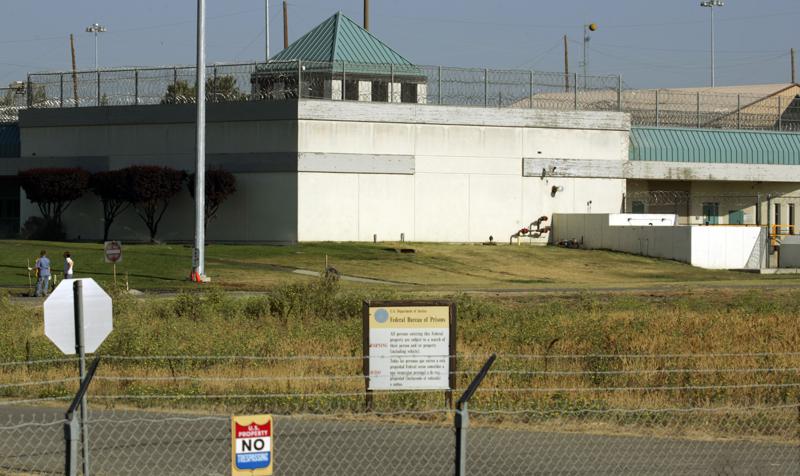Abuse-clouded prison gets attention, but will things change?

DUBLIN, Calif. (AP) — For months, inmates and staff say, their calls for help were ignored. And in this aging prison of deep despair — a place where sexual abuse has been rampant, authorities acted with utter indifference and the workforce was deeply demoralized — the cries for help had been many and varied.
DUBLIN, Calif. (AP) — For months, inmates and staff say, their calls for help were ignored. And in this aging prison of deep despair — a place where sexual abuse has been rampant, authorities acted with utter indifference and the workforce was deeply demoralized — the cries for help had been many and varied.
Just weeks earlier, an Associated Press investigation had revealed a culture of abuse and cover-ups that had persisted for years at the Federal Correctional Institution in Dublin, California, a women-only facility called the “rape club” by many who know it. Because of AP reporting, the head of the federal Bureau of Prisons had submitted his resignation in January. Yet no one had been named to replace him, so he was still on the job. Now he was responding to the problems in Dublin — but only after an angry congresswoman had called him to complain.
So early March found the lame-duck administrator, flanked by a task force of senior agency officials, arriving at the prison after flying in to meet inmates and staff in person. According to Dublin inmates, this was how he faced them as he toured the facility: “It’s horrible. It’s absolutely horrible. I’ve never experienced anything like this. In my career, I’ve never been part of a situation like this. This is really unprecedented.”
Those words, spoken about the troubled Dublin facility, come not from an activist or inmate advocate, not from any elected official, not from anywhere outside the prison walls. They come from Thahesha Jusino, its newly installed warden.
Her predecessor, Ray J. Garcia, is one of five Dublin employees who have been charged since last June with sexually abusing inmates.
“We’ve really lost a lot of credibility through all of this, which is understandable, because it’s appalling what has happened,” Jusino said in an interview with the AP.
This story is based on interviews with more than a dozen people familiar with the visiting task force’s work, the prison’s operations and the abuse crisis. They include current and former inmates, employees, lawyers, government and union officials. Many spoke on condition of anonymity for fear of retaliation or because they were not authorized to speak publicly.
The AP visited Dublin, about 21 miles (34 kilometers) east of Oakland, during the same time as the task force’s visit, the week of March 7. Lawmakers, disturbed by reports of abuse, also traveled there shortly after. Carvajal and some task force members returned to Dublin in April. In one sign of progress, the agency replaced both of the prison’s associate wardens Carvajal, a Trump administration holdover, submitted his resignation Jan. 5 but said he would stay on until a successor is named. He joined the task force for the first three days of its weeklong first visit to Dublin.
But even as the task force was arriving, and as scrutiny from the outside appeared finally to be at hand, things did not seem to be proceeding in a positive direction.
Officials moved inmates out of the special housing unit so it wouldn’t look as full when the task force got there. And they lied to Carvajal about COVID-19 contamination so inmates in a certain unit couldn’t speak to him about abuse.
Those who managed to get to Carvajal didn’t hold back. In one emotional scene, a woman who said she was abused by prison officials tearfully confronted him in a recreation area as he and members of the task force were meeting with inmates.
The woman shared graphic details of her alleged abuse. She spoke for about 15 minutes and grew increasingly upset, calming down only after prison officials brought her tissues. She was eventually taken out of the room and brought to a prison psychologist, where she was offered immediate release to a halfway house.
She objected. She wanted to wait so she could tell her story publicly to congressional leaders expected at the prison. But people at the prison say she wasn’t able to thoroughly express her concerns.
Bureau of Prisons and Justice Department officials told the woman that because she was a potential witness, she couldn’t talk about the investigation, the people said. The woman was moved to a halfway house soon after the tour. In another charged moment, a group of Dublin workers lashed out at Carvajal for putting Garcia in charge of a women’s prison when he’d already had a reputation in prison circles as a misogynist.
“You created this monster,” one worker told Carvajal. Asked another: “Why did you create this toxic environment? Why did you pick Garcia as the warden?”
Garcia is accused of molesting an inmate on multiple occasions from December 2019 to March 2020 and forcing her and another inmate to strip naked so he could take pictures while he made rounds. Investigators said they found the images on his government-issued cellphone. His lawyer refused an interview request.
Garcia is also accused of using his authority to intimidate one of his victims, telling her that he was “close friends” with the person investigating staff misconduct and boasting that he could not be fired. He has pleaded not guilty.
Carvajal promoted Garcia from associate warden to warden at Dublin in November 2020, after Garcia’s alleged misconduct but before the agency said it knew about it. Carvajal told the workers that if he had known about Garcia’s reputation or alleged abuse, he would’ve chosen a different warden.
Speaking to inmates about Garcia, however, Carvajal said something a bit different — that he believed in “innocent until proven guilty.”